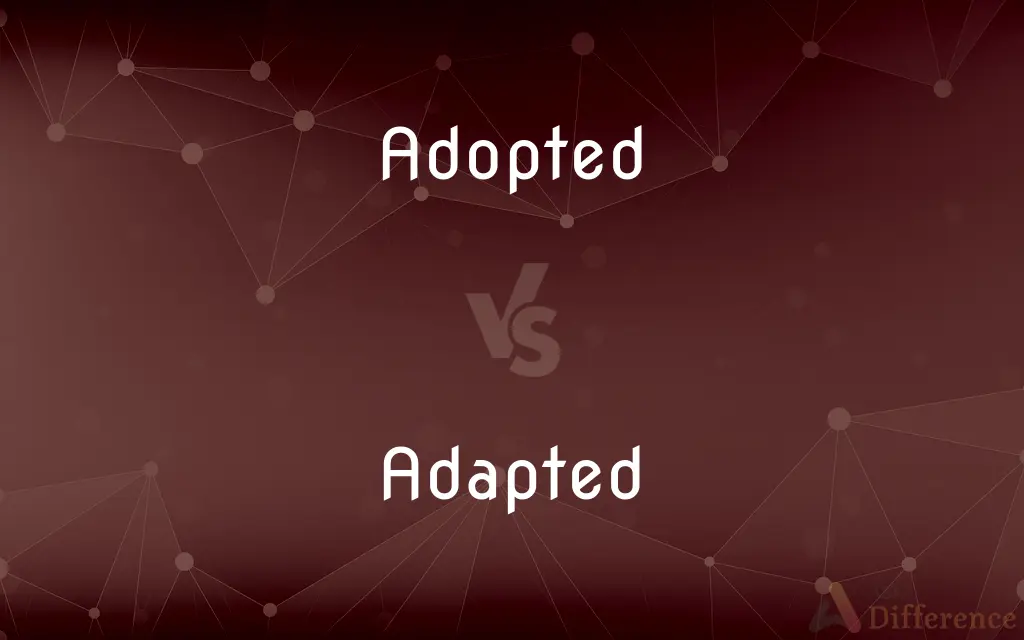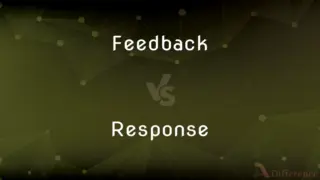Adopted vs. Adapted — What's the Difference?
By Fiza Rafique & Maham Liaqat — Updated on April 20, 2024
"Adopted" refers to legally taking another's child as one's own, whereas "adapted" involves modifying something to fit a new use or environment.

Difference Between Adopted and Adapted
Table of Contents
ADVERTISEMENT
Key Differences
"Adopted" specifically pertains to the legal act of taking on the parenting responsibility for a child from other biological parents, indicating a formal and recognized relationship. On the other hand, "adapted" describes changes made to an object, idea, or organism so it better suits new conditions or purposes.
When someone is "adopted," they typically become a family member with all legal and social rights that pertain to biological offspring. Conversely, "adapted" often refers to adjustments in behavior, design, or structure, like species evolving traits to survive in changing habitats.
"Adopted" can also apply in a broader sense to ideas, policies, or practices that are accepted and implemented within new contexts, maintaining the core essence but recognizing it in a new legal or organizational framework. Whereas, "adapted" suggests a transformation or alteration to improve functionality or effectiveness under new circumstances.
In literature or media, a story might be "adapted" from a book to a film, involving significant alterations to fit the different medium. In contrast, a legal framework might be "adopted" by a country, implying it is embraced largely as it is without substantial changes.
Emotional and social processes are often involved when a child is "adopted," focusing on integration and acceptance into the new family. Adaptation, however, can be a strategic response, such as businesses adapting to market changes or technological advancements.
ADVERTISEMENT
Comparison Chart
Definition
Legally taking another’s child as one’s own.
Modifying something to suit new conditions.
Context
Legal, familial.
Environmental, technological, literary.
Process
Involves legal procedures and emotional bond.
Involves adjustments, modifications.
Outcome
Creates familial relationships.
Enhances functionality or fit.
Example Usage
Adopted into a new family.
Adapted for use in a different environment.
Compare with Definitions
Adopted
Assumed as a pose or mannerism.
He adopted a look of seriousness.
Adapted
Altered to fit new uses.
This recipe was adapted for vegetarian diets.
Adopted
Legal acceptance of a child as one's own.
She was adopted at the age of five.
Adapted
Modified for a particular use or purpose.
The software was adapted for educational purposes.
Adopted
Made one's own from another source.
She adopted his optimistic attitude.
Adapted
Changed to better suit conditions.
They adapted the novel into a movie.
Adopted
Accepted or endorsed.
The policy was adopted unanimously.
Adapted
Adjusted to a new environment.
Plants adapted to the desert climate.
Adopted
Chosen or taken up.
He adopted a new nickname.
Adapted
Customized to individual needs.
The phone interface was adapted for easier accessibility.
Adopted
To take on the legal responsibilities as parent of (a child that is not one's biological child).
Adapted
To make suitable to or fit for a specific use or situation
Adapted the novel into a movie.
Adapted the company policy to take internet use into account.
Adopted
To become the owner or caretaker of (a pet, especially one from a shelter).
Adapted
To cause to be able to survive and reproduce under certain conditions. Used in the passive
“Every species is adapted to a rather restricted selection of properties of the environment” (Ernst Mayr).
Adopted
To take and follow (a course of action, for example) by choice or assent
Adopt a new technique.
Adapted
To change in order to meet the requirements of new circumstances or conditions
The music business had to adapt to digital technology.
Adopted
To take up and make one's own
Adopt a new idea.
Adapted
To become able to survive and reproduce under certain conditions
Hawks have adapted to living in cities.
Adopted
To move to or resettle in (a place).
Adapted
Simple past tense and past participle of adapt
Adopted
To take on or assume
Adopted an air of importance.
Adapted
Having been subject to an alteration or change to fit a different circumstance or medium.
That movie was an adapted novel.
Adopted
To vote to accept
Adopt a resolution.
Adapted
Changed in order to improve or made more fit for a particular purpose;
Seeds precisely adapted to the area
Instructions altered to suit the children's different ages
Adopted
To choose as standard or required in a course
Adopt a new line of English textbooks.
Adopted
Simple past tense and past participle of adopt
Adopted
Taken by adoption; taken up as one's own; as, an adopted son, citizen, country, word.
Adopted
Acquired as your own by free choice;
My adopted state
An adoptive country
Adopted
Having been taken into a specific relationship;
An adopted child
Common Curiosities
Is adopted used only in legal contexts?
While often used in legal contexts, "adopted" can also mean broadly accepted or taken up in various social or organizational settings.
What are common things that get adapted?
Common things that get adapted include books into movies, products for new markets, and strategies for different business environments.
Can "adapted" refer to personal change?
Yes, "adapted" can refer to personal change, especially in terms of adjusting one's behavior or mindset in new circumstances.
How does an adapted film differ from its original book?
An adapted film may alter, condense, or expand elements of the book to suit cinematic storytelling and audience expectations.
Can technologies be adopted?
Technologies can be adopted, meaning they are widely accepted and used within a community or organization.
Why is adaptation important in business?
Adaptation is crucial in business to stay competitive and responsive to changing market dynamics and consumer needs.
What does it mean to adapt a recipe?
To adapt a recipe means to alter its ingredients or methods so it suits different tastes, dietary restrictions, or available ingredients.
What does it mean to be adopted?
Being adopted means becoming legally recognized as a child of someone who is not one's biological parent.
How is an idea adapted in different industries?
An idea is adapted by altering it to fit the specific requirements or constraints of different industries.
Is adaptation always intentional?
Adaptation can be either intentional, such as in technology and business, or natural, as in evolutionary processes.
What role does adaptation play in evolution?
Adaptation is a key mechanism in evolution, allowing species to survive and thrive by developing traits suited to their environments.
What is the difference between adopting a policy and adapting a policy?
Adopting a policy involves implementing it as it is, while adapting a policy involves modifying it to better fit the current situation or needs.
Can one adapt to a culture?
Yes, one can adapt to a culture by learning and integrating the norms, values, and behaviors typical of that culture.
What does adopting a method involve?
Adopting a method involves taking it on and using it as prescribed, often within academic, scientific, or professional contexts.
Share Your Discovery

Previous Comparison
Stack vs. Pile
Next Comparison
Feedback vs. ResponseAuthor Spotlight
Written by
Fiza RafiqueFiza Rafique is a skilled content writer at AskDifference.com, where she meticulously refines and enhances written pieces. Drawing from her vast editorial expertise, Fiza ensures clarity, accuracy, and precision in every article. Passionate about language, she continually seeks to elevate the quality of content for readers worldwide.
Co-written by
Maham Liaqat















































